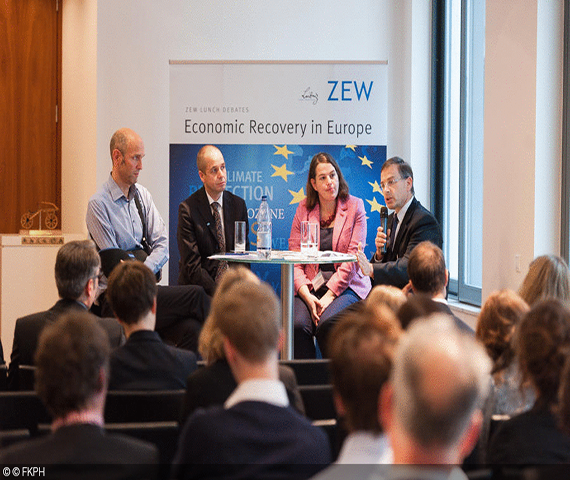ZEW Lunch Debate in Brussels – Fighting Youth Unemployment Involves Education Policy, Labour Market Institutions, and Employers and Unions
ZEW Lunch Debate in BrusselsHow to best fight youth unemployment in Europe? Speakers and panellists from the areas of research, politics, and business addressed this key topic at the ZEW Lunch Debate in Brussels. The event took place at the Representation of the State of Baden-Württemberg to the European Union on 18 November 2014. In his presentation, Professor Holger Bonin, head of research department at the Mannheim Centre for European Economic Research (ZEW) pointed to the fact that youth unemployment is not a purely cyclical phenomenon.
Being a structural and multifaceted labour market issue in Europe, the youth unemployment challenge will not disappear automatically in times of economic recovery, according to Bonin.Youth unemployment is a pressing problem in Europe, but in no way a new one. In many EU Member States the current rate is on the year-2000 level. Efficiently tackling youth unemployment, Bonin added, calls for multi-level action, involving education and social policy, labour market institutions, and employers and unions.
The subsequent panel discussion featured Dr. Max Uebe, head of the “Sectorial Employment Challenges, Youth Employment and Entrepreneurship” unit at the Directorate-General for Employment, Social Affairs and Inclusion, Jude Kirton-Darling, Member of the European Parliament for North East England and member of the British Labour Party, and Dr. Gerhard Dambach, Managing Director of Robert Bosch S.p.A. and management board member of the German-Italian Chamber of Commerce in Milan. Labour market expert Holger Bonin and Olaf Hahn, Senior Vice President of the Robert Bosch Foundation, opened the Lunch Debate and welcomed some 70 attendants, including representatives from the European Parliament, the European Commission, NGOs, companies, and associations.
Max Uebe emphasized the key role of the Youth Guarantee, the “flagship” in the EU Commission’s strategy to fight youth unemployment. The Youth Guarantee, Uebe said, is “much more than an active labour market policy. It is a structural reform that involves partnerships between the relevant stakeholders.” Jude Kirton-Darling, whose electoral district in North East England is particularly affected by youth unemployment, argued for policy initiatives that stimulate economic growth and create more jobs in Europe – such as the investment programme worth 300 bn euros that the new President of the European Commission, Jean-Claude Juncker, called for. Gerhard Dambach gave an overview of the Robert Bosch company’s initiative to implement a training programme for young employees in Italy similar to the German dual vocational system.
In the following open discussion, the audience contributed more viewpoints and expertise on the topic of youth unemployment. Question from the audience included: What is the role of private placement agencies, alongside their public counterparts? Are lower entry-wages are means to provide young people access to the labour market? Could a reduced job protection system for newly hired staff increase flexibility and efficiency of labour markets? Given the huge impact of youth unemployment on the future of the European societies, these questions will likely remain on the agenda of experts, policy-makers, and stakeholders in the European Union.
More information on the ZEW Lunch Debates and forthcoming events in the series
